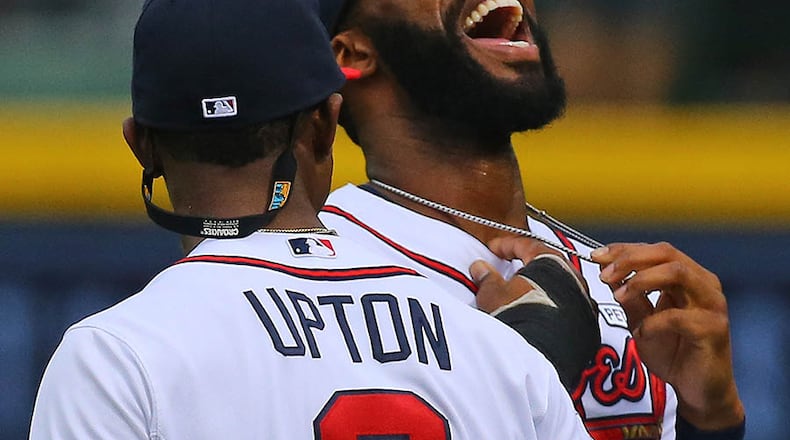Editor's Note: This is the first in an occasional series looking at the Braves by position. Today: Outfield
The Braves outfield that many expected to be one of baseball’s best has been far from it in two seasons that Jason Heyward and the Upton brothers have manned it. And now the question is whether the trio has already played its last game together.
With Justin Upton and Heyward eligible for free agency after next season, with B.J. Upton two years into a five-year, $75.25 million contract the Braves are desperate to shed, there’s a chance that at least one or even two of them could be moved this offseason.
Once a new general manager is in place, one of the first orders of business will be deciding which of seven arbitration-eligible players (six pitchers plus infielder Ramiro Pena) the Braves will offer contracts by Dec. 2, five days before the Winter Meetings in San Diego. But another matter that will be discussed plenty between now and then is the outfield.
Justin Upton had 29 homers, eight stolen bases and a career-high 102 RBIs in 2014. But Heyward and B.J. Upton had only a combined 23 homers, 93 RBIs and 40 stolen bases. And that was a lot better than a year ago, when Heyward had a couple of stints on the disabled list, B.J. had one of the worst seasons ever by an Atlanta player and the pair combined for only 23 homers, 64 RBIs and 14 stolen bases.
This year Heyward hit .271 with a .351 on-base percentage, but had only 11 homers and a .384 slugging percentage, power numbers far below what was expected after he arrived as the sport’s top prospect in 2010 and won Baseball America’s major league rookie of the year award over Buster Posey.
B.J. Upton was better in 2014 than in his disastrous first season with the Braves, but that’s not saying much. He still ranked as one of baseball’s worst position players in 2014, hitting .208 with 12 homers, 35 RBIs and more than three times as many strikeouts (173) as walks (57) in 519 at-bats.
In two stunningly bad seasons with the Braves, he’s hit .198 with 21 homers and 61 RBIs. His .314 slugging percentage in two years with the the Braves is more than 100 points lower than his .422 slugging percentage over eight seasons with the Rays.
To trade him, the Braves will presumably have three choices: A.) eat almost the entire amount he’s owed; B.) trade him in a package that includes a prospect, in which case the Braves would still have to pay most of what he’s owed; or C.) trade him for another bad contract, such as a B.J.-for-Edwin Jackson trade the Braves and Cubs discussed last summer. That deal could resurface.
Moving Upton this winter would allow the Braves to avoid going into next season with a distraction similar to what they had entering this season with Dan Uggla, who was finally released in July with about $19 million still owed to him over the last 1 1/2 seasons of his contract. That was the most money the Brave ever ate on a contract and they seem prepared to eat far more of B.J.’s deal to shed what could go down as the worst decision that fired general manager Frank Wren ever made.
Because the Braves let Jordan Schafer go on waivers last summer and Emilio Bonifacio is eligible for free agency, should they trade Upton, the Braves’ only in-house center-field option might be Todd Cunningham, 25, a solid defensive outfielder who had a modest .287 average and eight homers in his second season at Triple-A Gwinnett.
It seems more likely the Braves, if they move B.J., would either move Heyward to center, or try to trade or sign a stop-gap center fielder for a year or two while giving speedy center-field prospect Kyle Wren a chance to develop.
The situation is obviously different with the Braves’ other two incumbent outfielders. Justin Upton is the Braves’ only big-time home-run threat other than Evan Gattis and Heyward’s defense is so strong that he’s arguably their best all-around player despite offensive shortcomings. The Braves wouldn’t be looking to trade either of them if they were signed beyond next season.
The Braves could try to re-sign at least one a to multi-year extension before spring training. However, given their payroll constraints, it seems most likely the Braves would not sign one of them and could trade the other this winter, possibly to add needed position depth to their minor league system or to fill another need on the major league roster, such as a frontline starting pitcher.
Trading either player could also open a spot for Gattis, who otherwise will probably be dealt this winter because the Braves have strong-armed catching prospect Christian Bethancourt ready to take over. If the Braves trade Heyward and keep Justin Upton, they could move the latter to right field, his former position with Arizona, and play Gattis in left field, where his defense is serviceable at best but might improve some with a full spring training at the position.
If they trade Justin Upton, the Braves could replace him with Gattis in left field and have Heyward stay in right or move to center.
Before signing Heyward, 25, to a two-year, $13.3 contract extension in February 2013, the Braves had discussed with him a long-term offer similar to the franchise-record seven-year, $135 million deal the Braves gave first baseman Freddie Freeman at that same time. Some familiar with the situation said Heyward was looking for a bigger contract than what the Braves offered and a deal the team viewed as far above what his offensive performance to date has merited.
Justin Upton, 27, is scheduled to make $14.5 million in 2015 in the final season of a six-year, $50 million contract he signed with the Diamondbacks.
About the Author
Keep Reading
The Latest
Featured


